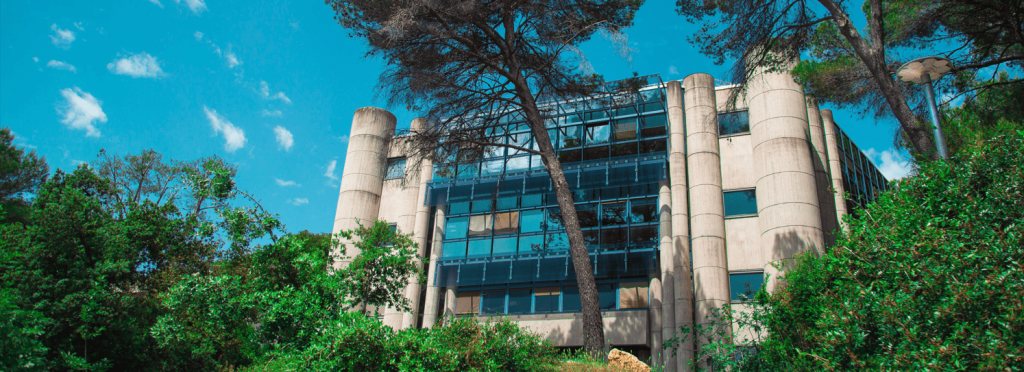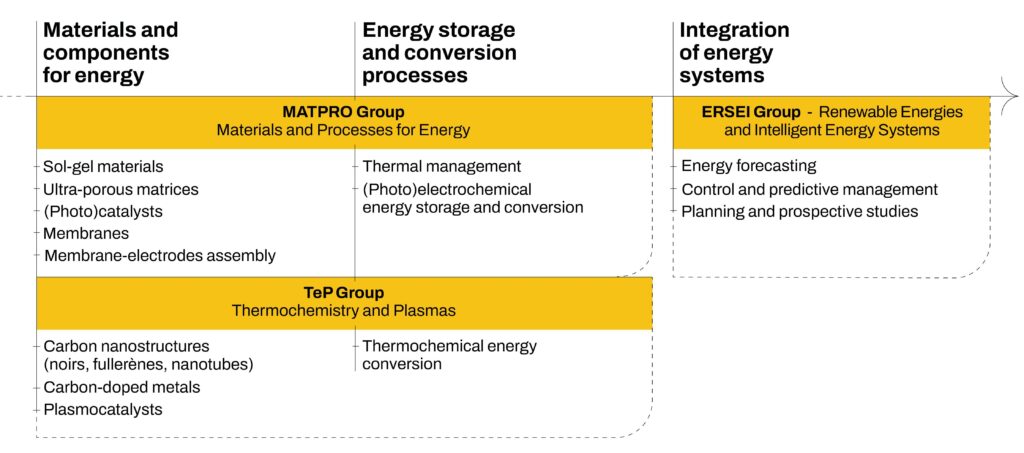The Center
PERSEE (Processes, Renewable Energies and Energy Systems) is a renowned research center specialising in energy transition. It brings together a rare diversity of scientific expertise in areas such as energy engineering, process engineering, materials science, chemical and thermal engineering, electrical engineering, applied mathematics, data science and meteorology for energy.

In brief
PERSEE’s scientific project is focused on the energy transition. Today, the Center is a leading authority in the field of decarbonising energy systems. Our research is conducted in the framework of French and international calls for excellence (ANR, Europe, etc.) and in direct collaboration with key industrial partners involved in this transition. This enables us both to contribute to high-level academic research and to the economic sphere (technology transfer, demonstration, etc.). In this respect, the Center fully embodies the dual academic and economic impact for which the École des Mines de Paris is renowned.
PERSEE also contributes significantly to training tomorrow’s researchers and engineers by participating through different participations in doctoral training, the post mater’s degree in Renewable Energy (ENR), the civil engineering program, and the PSL “Energy” Master of Science.
We provide our students with top-level scientific training in the prestigious setting of Sophia Antipolis. We also offer numerous connections with leading academic and industrial partners.

Structure of research activites
The aim of our research is to develop solutions designed to improve the energy efficiency of systems and promote the integration of new energy technologies and low-carbon energies into the future energy mix. Our ambition is to contribute to the electrification of different sectors and the decarbonisation of society, with a view to reaching European climate targets.
Research themes and groups
The Center’s integrated approach is based on three research themes that are materials and components for energy, energy storage and conversion processes, and the integration of new technologies into energy systems.
Our team is organised into three research groups: Materials and Processes for Energy (MATPRO), Thermochemistry and Plasmas (TeP), and Renewable Energies and Intelligent Energy Systems (ERSEI).

Domains of excellence
The PERSEE team combines innovation and cutting-edge expertise in five key areas: aerogels, plasmas, hydrogen, renewable energies and artificial intelligence.
Hydrogen is one of the common threads in our three research groups. We combine our skills to work on challenges like low-carbon hydrogen production (electrolysis, photoelectrolysis, methane pyrolysis), electrochemical conversion (fuel cells) and integration (in energy systems, territories, etc.).

The three research groups
MATPRO:
Materials and Processes for Energy
MATPRO mainly works on two of PERSEE’s three thematic areas: “materials and components for energy” and “energy storage and conversion processes”. In line with the Center’s research strategy in the field of New Energy Technologies, the group’s research focuses on :
- thermal insulation and low thermal loss envelopes (e.g. buildings)
- hydrogen energy (fuel cells and low-carbon hydrogen production)
- electricity storage (batteries and super-capacitors)
One of our specialties is aerogels (C, SiO2, TiO2, SnO2) derived from sol-gel processes, a fascinating class of materials and a high-potential technology that we’ve been working on for over thirty years. Aerogels have applications as thermal superinsulators for buildings envelopes or electrode materials for electrochemical energy storage and conversion devices. Studies are also being carried out on composite membranes for proton exchange membrane fuel cells (PEMFC) incorporating functionalised clays. All materials developed are integrated into components and tested on test benches under real operating conditions, as close as possible to the application.
We also conduct research at the system level, notably in the field of fuel cells for mobility, with a focus on the fluidic and thermal aspects of their fluids supply (hydrogen, air, water). Degradation phenomena are also studied, and physical models are developed in line with the Center’s favoured approach “from micro to macro”.
TeP:
Thermochemistry and Plasmas
The TeP research group studies and develops new electrical thermochemical conversion processes for energy and chemical applications. The group’s knowhow ranges from high-performance plasma sources to breakthrough thermochemical processes. At the frontier between physics and chemistry and straddling science and technology, our unique expertise is internationally recognised, thanks in particular to the successful industrial transfer of flagship processes at the heart of industrial transition, such as thermal plasma pyrolysis of methane.
In the three decades of Groupe TeP’s existence, our multi-disciplinary team has published over 200 A-rank articles, worked on 15 industrial and European projects, spawned several key breakthrough technologies at unrivalled experimental facilities, and clocked up a dozen patents. TeP group is indisputably a key player in applied research into plasma electrification of thermochemistry in heavy industry on an international scale, and our research activities contribute to the global scientific effort to decarbonise and depollute industry as part of the ecological and energy transition.
ERSEI:
Renewable Energies and Intelligent Energy Systems
ERSEI develops the “Integration of Energy Systems” theme. A differentiating characteristic of our research is that we link efficiently research on renewable resources, power systems, and electricity markets.Our work focuses on three interdependent areas:
- The group is a pioneer in the field of renewable energy (RES) forecasting, with a leading positioning internationally thanks to the coordination of several major European projects. Today, we’re working on innovative methods for energy forecasting, including RES production, consumption, dynamic power line capacity (DLR), and electricity prices.
- We are also working on the control and predictive management of energy systems: smart-homes, micro-grids, distribution and transmission networks, virtual power plants, etc. We focus on stochastic optimisation methods, distributed approaches, and AI-based methods such as prescriptive analysis.
- Our third area of research concerns the prospective modelling of energy systems to optimise planning decisions as part of their transition to low-carbon systems. In addition to electricity grids, we consider multi-energy systems, the renovation potential of building stock, industrial basins, and other systems or territories in transition.
The ERSEI group coordinates also the “Renewable Energies” international specialised master’s degree, in partnership with nine European universities and research centers.
Training and Education
The PERSEE Center is mainly involved in three types of training: our PhD program, our Specialized Master in Renewable Energies (MS ENR), and Mines Paris civil engineering program.
We offer our students top scientific training in an attractive setting at Sophia Antipolis, as well as numerous connections with leading national and international academic and industrial players. Our teaching and research staff are recognised for their first-rate supervision and close connection with their doctoral and master students.
Recruitment
We’re hiring! We’re regularly looking for new lecturer-researchers, research engineers, laboratory technicians and administrative assistants to join our teaching and research project teams. You can check below the current doctoral thesis offers and other open positions.


